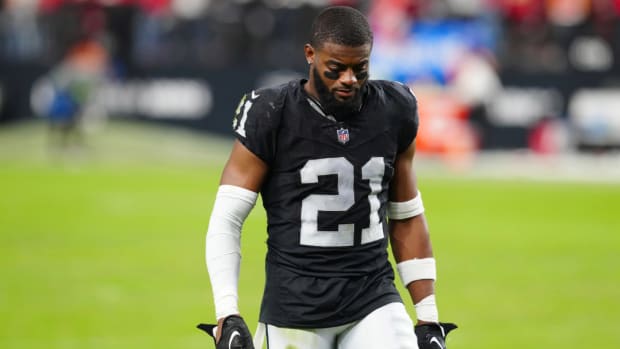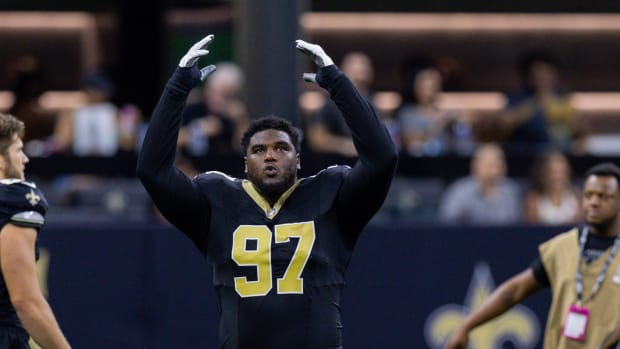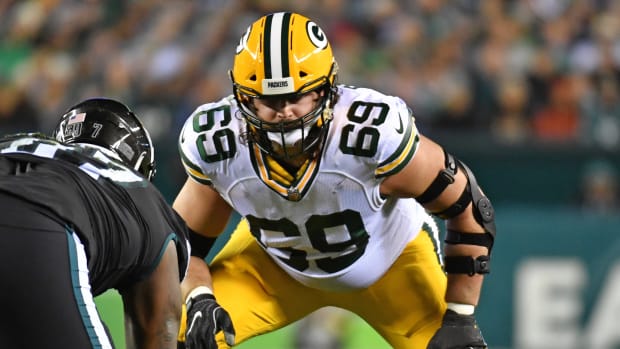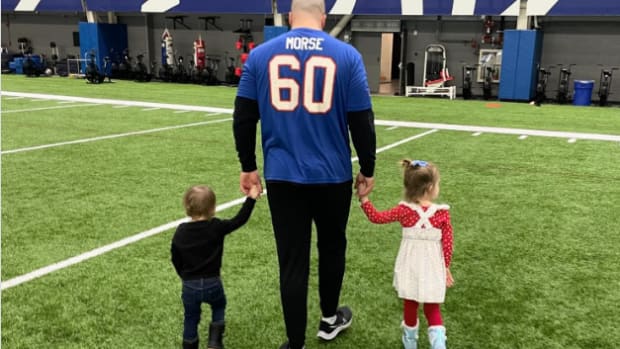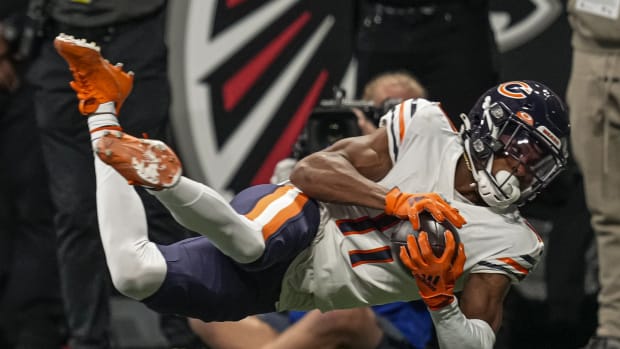What to expect at the NFL hearing
Judges Steven Colloton, William Benton and Kermit Bye will hear oral arguments from each side's attorneys Friday at 10 a.m. CDT in a St. Louis courtroom. The attorneys will provide conflicting accounts of whether U.S. District Judge Susan Nelson was correct in enjoining the NFL's lockout, which bars NFL players from their employment with NFL teams. The three judges, two of whom have twice voted to temporarily stay Judge Nelson's order, will likely issue their decision within the next month.
Here's a breakdown of what to expect:
1. What will happen during the hearing?
The substance of the hearing will begin when an attorney for the NFL and its teams, the appellants, delivers a 30-minute oral argument summarizing why the three-judge panel should vacate Judge Nelson's preliminary injunction and enable the NFL to continue the lockout, at least until there is a verdict in a trial of Tom Brady et al. v. NFL. Such a trial is unlikely to occur until 2012 or later.
An attorney for the players, the appellees, will then deliver a 30-minute oral argument summarizing why the three-judge panel should sustain Judge Nelson's preliminary injunction and prevent the NFL from conducting a lockout until the trial. The appellees' attorney, in other words, will argue that the lockout is illegal and thus the players should be able to go back to work.
Unlike real or dramatized courtroom trials, appellate hearings are conducted without juries, witnesses or evidence. Instead, three judges listen intently to precise, often narrow legal arguments furnished by the attorneys, who in this case are prominent appellate lawyers. Paul Clement, who served as Solicitor General during President George W. Bush's administration, will argue for the NFL, while Theodore "Ted" Olson, who successfully represented George W. Bush in George W. Bush v. Al Gore and who would precede Clement as a Solicitor General, will argue for the players. Clement and Olson are considered two of the nation's top appellate lawyers and both have won many oral arguments and repeatedly shown intellectual dexterity and quick thinking. One of them, however, will lose Friday.
While appellate hearings are generally considered less dramatic than jury trials -- neither a "smoking gun" piece of evidence nor an engrossing witness will emerge -- they can still prove extremely intense. Appellate judges can, at any time, interrupt attorneys during their oral arguments and ask a series of difficult, abstract or even off-topic questions. The attorneys have no choice but to respond politely and substantively. On occasion a three-judge panel is regarded as a "hot bench", whereby the judges ask many questions, sometimes to the point of preventing the attorneys from completing their oral arguments in the allotted time.
While not a perfect tea leaf by any means, if the judges seem more hostile to Clement or Olson, they may be signaling that they are leaning in favor of the other side.
2. What will be the key legal arguments?
Most of the debate will center on whether labor law or antitrust law is the most appropriate source of federal law to evaluate Judge Nelson's order to enjoin the NFL's lockout. Complicating the analysis is the undeveloped role of the National Labor Relations Board ("NLRB"), which is still investigating the unfair labor practices charge filed by the NFL on Feb. 14.
In its charge, the NFL contends that the NFLPA illegally disclaimed its representation of NFL players in order to subject the league to antitrust litigation. If the NFL ultimately prevails before the NLRB, the players' antitrust litigation would be jeopardized. The litigation requires that the NFLPA no longer exclusively represents NFL players in employment matters; a sham decertification would mean the NFLPA still exclusively represents those players. The NLRB, however, has neither acted on the NFL's charge nor indicated when it will do so, thereby leaving faster-acting judges to make legal assessments without the benefit of NLRB guidance.
In terms of specific arguments to be brought before the three-judge panel, the NFL believes that Judge Nelson failed to properly apply the Norris-LaGuardia Act, a federal labor law that disfavors the use of injunctions while labor and management are at impasse. The players, for their part, contend that the Act only applies in the context of strikes, which are initiated by employees, rather than lockouts, which are initiated by management. The players also portray a labor law such as the Norris-LaGuardia Act as unrelated to their antitrust litigation since neither the NFLPA nor any other union represents them.
Expect oral arguments on the Norris-LaGuardia Act to dwell on whether certain words contained in the Act should be read literally or expansively. The arguments will also offer conflicting accounts of how Congress, which passed the Act during the height of the Great Depression in 1932 and undoubtedly without a second's thought to its potential application to disputes between billionaire team owners and millionaire players, intended the Act to be used.
The two sides will also contest whether the NFLPA's decertification was a sham. If, as the players contend, the NFLPA no longer represents them, and if the sides are no longer bargaining in good faith, then the federal labor exemption, which insulates collectively bargained rules from antitrust review, would no longer apply. Although the NLRB, and not the three-judge panel, will determine whether the NFLPA's decertification was legitimate or a sham, the panel likely will link its ultimate decision to its views on that subject.
Regarding the NFLPA's purported decertification, expect the NFL to insist that through federal mediation, litigation settlement discussions and other channels, the owners and players continue to collectively bargain in good faith, thus rendering the NFLPA's formal status as the players' exclusive bargaining unit immaterial. The players will counter that the NFLPA no longer represents them and that they never would have agreed to mediation and settlement discussions if doing so would have barred their antitrust claims. The players will also highlight Judge Nelson's reasoning that NLRB's ongoing review of the NFL's unfair labor practices charge should not stop review of the players' antitrust arguments.
Lastly, the two sides will furnish contradictory takes on how well Judge Nelson applied the four factors necessary for the players to receive a preliminary injunction. The four factors are:
a) whether the players would probably win on the merits of their antitrust claims in a full trial;
b) whether the players showed a threat of irreparable harm (meaning a harm that cannot later be remedied by money damages);
c) whether the players proved that a preliminary injunction would not harm the NFL more than it helps NFL players;
d) whether the players demonstrated that a preliminary injunction would serve the public's interests.
In a previous column, I examined the competing arguments for each of the four factors. While each factor will receive attention Friday, expect the topic of harms to the players and owners to attract the most scrutiny. The players will maintain that a lockout causes irreparable harm, since it suspends their careers in a state of limbo that only becomes more damaging over time. Free agents, for example, cannot sign with teams and rookie players cannot begin the often difficult transition from college football to NFL football.
In an attempt to portray the owners as the lone villains and to claim solidarity with other NFL employees, the players will also highlight an amicus brief filed by NFL coaches on behalf of the players. In the brief, the coaches described how they would suffer irreparable harm if the 2011 NFL season is lost. Finally, the players will point out that not one NFL team has shown that it would lose money if a 2011 NFL season took place. Team owners would thus seemingly escape harm if a court enjoined their lockout.
The league, however, will likely emphasize that forcing it to resume business operations in the absence of a collective bargaining agreement would result in a very different and probably less popular and less profitable league. The salary cap, draft and other restrictions on competition would all be vulnerable to antitrust challenge and resulting treble damages.
In response, the league and its teams would be poised to moderate or even outright eliminate restrictions on players, which have helped sustain a profitable business model for small- and large-market teams alike. Alternatively, the league might be tempted to agree on a new collective bargaining agreement with players in which the players would enjoy the leverage. Both possibilities, in the NFL's view, would be harmful to their interests.
3. Who will win?
The NFL enters the hearing as the clear favorite. Two of the three panel judges have twice voted to stay Judge Nelson's order. In doing so, they have revealed deep skepticism of the players' legal arguments.
That said, Ted Olson is a highly persuasive advocate who has swayed even the most disbelieving judges. Perhaps he can engineer a comeback win for the players.
4. What happens after the panel makes its decision in June or July?
Technically, the losing party would be left with two improbable sources of appeal: an "en banc" re-hearing by the 11 active judges on the Eighth Circuit or a U.S. Supreme Court review of an interlocutory order. While the league would have a slight edge over the players in obtaining one of these appeals, neither party would enjoy encouraging odds.
More practically, a victory for the NFL would permit the league to continue the lockout through the 2011 NFL season. Players would then have the unenviable choice of either acquiescing on a new CBA -- which probably contains, from their perspective, unfavorable terms, such as a rookie wage scale, an 18-game season and a reduction in salaries for future player contracts -- or sitting out the 2011 season, and not getting paid or receiving healthcare financed by others, in hopes that the owners might relent on some of their demands.
A league victory might also cause dissension among players, who have, to date, appeared unified. Some players would undoubtedly want to get a new collective bargaining agreement done, even a deal with unfavorable terms. Yet other players, and perhaps those who enjoy substantial savings or other sources of income, might be more willing to sit out a 2011 NFL season. Player agents, though not formally part of the discussions, may also take on a greater advocacy role for players to reach a deal, as player agents are generally not paid unless players are paid.
Alternatively, if the players win before the three-judge panel, the NFL would resume business operations and, given the unattractive prospect of antitrust scrutiny, be poised to reach a new, and more player-friendly, collective bargaining agreement with the players. The league might instead contemplate a total shutdown of operations, though such a plan would be unlikely to work.
It is probably safe to say that whichever party loses before the three-judge panel will be encouraged, if not outright pressured, by NFL fans to accept defeat, agree to terms for a new collective bargaining agreement and get back to football.
5. While the NFL and players wait for the panel's decision, will the lockout continue?
Yes, and given that a decision will likely take several weeks, if not a month, players can expect to remain locked out in June.
































